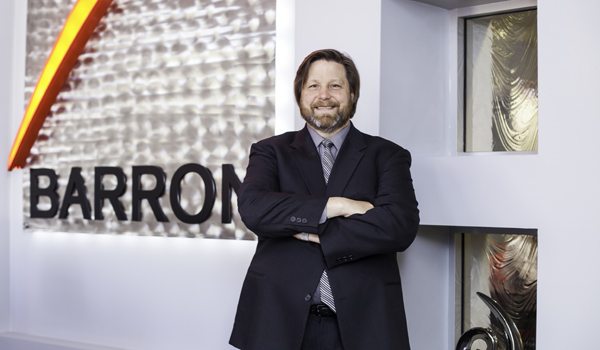Adam Miller brought a broad range of experiences in finance, accounting, auditing, personnel, real estate, manufacturing and operational management to his role as president of the Arizona Chapter of Financial Executives International (FEI).
Miller became CFO of Barron Lighting Group in 2010 and has helped the company achieve double-digit growth in the years since joining the executive team.
Az Business talked with Miller about the evolving role of the CFO
Az Business: What attracted you to the financial side of business?
Adam Miller: When I was in high school, my guidance counselor asked me what I wanted to do and I said, “I want to make money.” He set me up in a bookkeeping class and I loved it. I fell in love with accounting. It clicked with me. It made sense.
AB: How has the role of the CFO changed since you started your career?
AM: It’s become a lot more about managing risk and information than it has about debits and credits. My job has become much more about managing people, managing information and managing risk. Probably the most important thing is when someone asks what I look at every day, I say I’m looking at cash availability because that really tells you what you can and cannot do in the future. Eventually, interest rates are going to go up, so if you’re a net borrower, that’s going to impact your bottom line. Even though money is very cheap, be cautious because when those rates start going up, I don’t think it’s going to be little.
AB: What impact are today’s CFOs having on the businesses that might not have been the case 20 years ago?
AM: A CFO has to be much more strategic and forward-thinking. Twenty years ago, CFOs were responsible for what was being reported and what happened. They were the financial watchdogs for their companies. That’s still there, but the expectation is that today’s CFOs are the most important adviser to owners and CEOs. The CFO has become much more of a strategic partner to the executive team. Making the right decision is not always about percentage return. Sometimes a return on investment might be happier employees or a lower turnover rate.
AB: How do you see the role of the CFO evolving over the next 10 or 20 years?
AM: The CFO is going to be pulled in more directions. When I was in school, I always hated the group assignments because I always thought I was the best thing since sliced bread and I could do everything by myself in half the time. The CFO in the future is going to have to become ingrained in the culture of all the different departments and be part of their process. The CFO will have to be a student of the rest of the organization so the CFO understands how decisions effect each department and also help each department understand the potential returns of the decisions that are made.
AB: Is Arizona a good place for financial professionals to build careers?
AM: There are a lot more opportunities to start a career here than when I moved here in 1987. People who are starting their career should choose a company that will give them different experiences. You need a variety of experiences to get to the executive level so you have more to draw upon than simply being with a company for 15 years. I was in real estate for a while. I was in home building and did multi-family management and land development. When we bought this building, that background was a huge help. Arizona is a dynamic environment. Having the diversity of experiences that Arizona offers is invaluable in building a career as a financial professional.
AB: How did you become affiliated with FEI?
AM: I was introduced to FEI when I was in between careers. They had a transition group than met every week. When you’re in that, you think that you’re the only one. I got in there and the caliber of people who were sitting in the room amazed me. That was the first time since I was 15 that I didn’t have a job, but it made me realize that a lot of people go through transitions and a lot of people share the same path that you’re on and it’s not always a smooth path.
AB: What kind of impact can FEI have on financial professionals?
AM: One of the most important aspects of FEI is meeting with your peers. When I first started coming to FEI, I knew of people, but never got to meet them face to face until FEI. In addition to the members, meeting the sponsors and speakers can be a tremendous resource for financial professionals. FEI is exclusive to a point, but it is much more inclusive than it has ever been. So it continues to become more relevant to members.
AB: How has the CFO of the Year program impacted the visibility of FEI and financial executives?
AM: To hear the stories and to make the CFO more human is encouraging and amazing. That event is a showcase event for financial executives. The people who are honored have really done things that are uplifting for the entire profession.
AB: What are your goals as president of FEI?
AM: One of the things we pride ourselves on as a local chapter is we have excellent programming and we want to continue that, diversify it and make it even more meaningful. We want to engage as many members as possible. We are also expanding our scholarship program with the help of our sponsors. That, to me, is very important because that’s a way we can give back to the community and give back to the profession.




